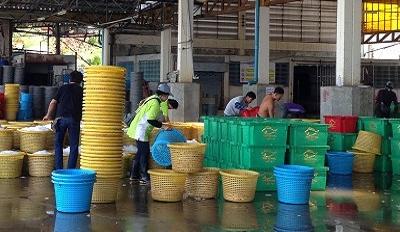
“Worker voice” is the current buzzword among corporate social responsibility professionals seeking to end labor exploitation in the seafood industry, yet the original meaning of worker voice – in which workers form associations to collectively bargain for better conditions on an equal footing with employers – is nowhere to be found. The Seafood Task Force, an industry-led multi-stakeholder initiative that includes companies such as Costco and Walmart, is trying to improve labor conditions and combat illegal fishing in Thailand’s seafood supply chain by taking an approach that includes “championing worker voice.” The group is exploring models including internal grievance mechanisms, hotlines, worker welfare committees and support centers. Thai Union, one of the world’s largest seafood companies, is piloting as part of its sustainable development strategy a project to install technology on fishing vessels that would both increase traceability of seafood products and provide “worker voice” in the form of mobile phone chat applications that allow crew to connect to friends and family.
While these initiatives, and the companies leading them, are doing important work to establish crew connectivity at sea and improve traceability and monitoring mechanisms within seafood supply chains, the approaches they are taking lack a meaningful role for workers and their organizations. Worker agency, exercised through trade unions and worker associations, should be secured in developing workplace standards, monitoring employer compliance, handling labor-management disputes, and ensuring complaints resolutions are effective. Absent a binding agreement negotiated with representative worker organizations, these initiatives do not fundamentally change the power dynamics that put workers at risk in the first place or prevent them from living in fear of reprisals should they speak out.
Forced labor, excessive working hours, piece-rate wages dependent on the amount of fish caught, and other illegal or questionable employment practices have enabled the industry to maintain consumer prices at artificially low levels. As a result, the world’s fish stocks are at a point where our oceans may be devoid of wild fish by 2048 unless we see a drastic intervention. To restore our oceans and protect the human rights of workers in the seafood industry, bold thinking and action that aligns “socially responsible seafood” with the United Nations Guiding Principles on Business and Human Rights (UNGPs) is needed.
ILRF is calling for a new social and environmental pact between business and civil society organizations where workers are empowered by their representative organizations to secure both decent work and sustainable fisheries. While the details of such an agreement must be negotiated between global union federations, local worker representatives, human rights organizations, environmental groups, and businesses all along the supply chain, there are important precedents from which lessons can be drawn. Such precedents include industry transformation initiatives such as the Bangladesh Accord on Fire and Building Safety and the Coalition of Immokalee Workers’ agreement with tomato growers in Florida to adhere to the Fair Food Program.
In its upcoming report, Taking Stock: Labor Exploitation, Illegal Fishing and Brand Responsibility in the Seafood Industry, ILRF seeks to spark a discussion about what such an agreement might entail by presenting a worker-centered approach to ensuring respect for the human rights of the most vulnerable workers in global seafood supply chains. The report lays out four structural elements that are essential to building an effective compliance program – the foundation for decent work in global seafood supply chains as well as long-term, sustainable profit for the seafood industry:
- a meaningful role for workers and their organizations in the design, implementation, and governance of the program, realized for fishers through at-sea communications with shore-based worker representatives;
- comprehensive and transparent risk assessments and verification of workplace compliance in line with the corporate human rights due diligence requirements of the UNGPs;
- legally-binding and enforceable agreements with retailers and buyers making a contractual commitment to ensure workers’ rights are respected by all actors in the supply chain; and
- a change in brand purchasing practices such that buyers don’t just demand but also enable producers to come into compliance with human rights norms.
In addition to including the structural reforms noted above, effective human rights and environmental compliance programs also need a governance structure and oversight body established through negotiations between industry, unions and worker rights advocates, and human rights and environmental organizations. To achieve the desired objectives, the negotiators will need to ensure the initiative has: an equitable governance structure; a well-resourced, self-financing secretariat with dedicated funds for worker training and legal representation; clear, prescriptive terms on the rights and responsibilities of each party to the agreement; and a clear dispute resolution process that ends with binding international arbitration.
Businesses, investors, consumers, and governments all have an important role to play in creating an enabling environment for decent work and sustainable fisheries. Both the oceans and the people who fish in them deserve respect and, given the egregious abuses that have been uncovered and continue around the world, a robust initiative that has the potential to transform the industry is needed. That will require bold industry leadership to commit not only to enable workers to speak out in cases of egregious rights abuses, but to working with worker organizations at international, national, and local levels to ensure structures are in place for meaningful worker agency.

